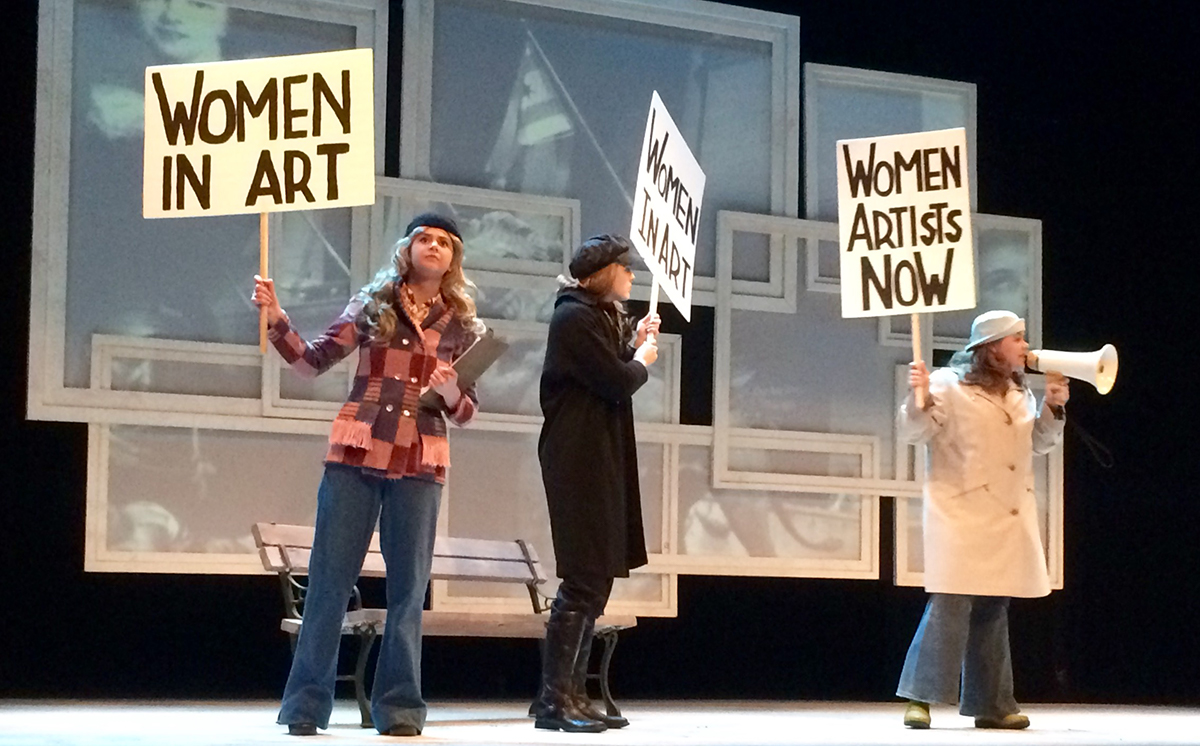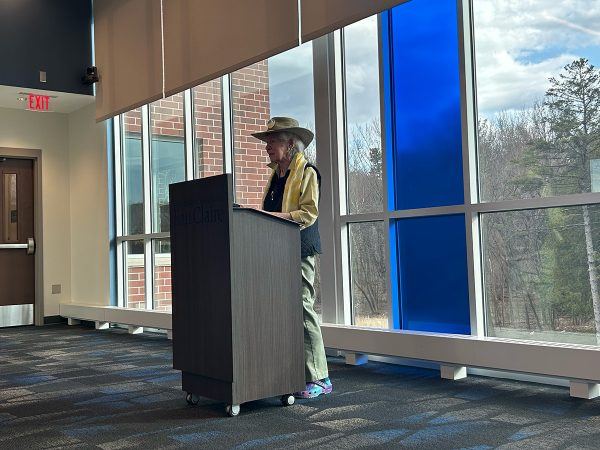‘The Heidi Chronicles’ follows one woman through personal and political trials
A witty and thoughtful play explores the changing role of women through the years
More stories from Deanna Kolell
Photo by Deanna Kolell
Clara (Olivia Haven), Debbie (Clara Kennedy) and Heidi (Kenzie Currie) protest the lack of representation of women artists.
A projector snaps to life, and as an art historian begins to expound on the nuances of forgotten female artists, “The Heidi Chronicles” sets the stage for what’s to come.
“The Heidi Chronicles” opened Thursday, April 13 in the intimate setting of Kjer Theatre, telling the story of Heidi Holland (Kenzie Currie), a brilliant art historian and feminist during the second wave of feminism.
Jennifer Chapman, UW-Eau Claire associate professor of theatre arts, theatre program coordinator and director of “The Heidi Chronicles,” said Heidi’s personal and political struggles resonate with audience members.
“Heidi’s journey to self-knowledge and self-love is universal,” Chapman said. “I think it is especially poignant for college students, many of whom may be in the midst of their own journeys, trying to figure those things out.”
Heidi must also navigate the constantly changing political climate during her adult years. She experiences the feminist movement during the ‘60s and ‘70s and watches as it dissolves in the ‘80s, her friends now considering it “passe.”
Throughout her struggles, Chapman said Heidi’s focus remains constant, as she tries to live her life with “honesty and integrity.”
The companions in Heidi’s life often make this difficult throughout the years. At some point in the play, Heidi’s clever friend Peter Patrone (Ben Qualley), her arrogant former lover Scoop Rosenbaum and her fickle childhood friend Susan Johnston (Emily Elliot) each seem to hinder Heidi in her personal journey rather than help her.
Carly Clark, a sophomore elementary education student, attended the play because she knew Aila Arndorfer, one of the onstage dressers. Clark said the most interesting part of Heidi’s character was watching her personality change depending on who she’s talking to.
Chapman said Currie, a sophomore student studying integrated strategic communication and theatre encapsulated Heidi’s multifaceted personality.
“Mckenzie is a terrific actor, and she is very good at achieving honesty and vulnerability onstage,” Chapman said. “We needed someone who could not only play the part, but lead the entire team of actors through the rehearsal process. She was a very loving and caring leader.”
Currie said acting as Heidi proved to be her most challenging role, as she rarely leaves the stage and has a substantial number of lines, including three monologues. Because the play is so wordy, she said it’s easy to revert to autopilot.
Another challenging aspect of her role is the jumps in time, as every scene takes place in a different year. The audience can follow along with the pictures in the background and the songs played during transitions, including Sam Cooke’s 1957 hit “You Send Me” and Aretha Franklin’s 1967 rendition of “Respect,” a landmark for the feminist movement.
Currie said it becomes more challenging to relate to Heidi as time goes on because she hasn’t shared many of her life experiences.
“Connecting with her at a personal level in each age is really hard,” Currie said. “As she goes, I become less and less relatable with her.”
However, Heidi is a very relatable character because she injects passion into everything she does. Although she doesn’t share Heidi’s enthusiasm for art, Currie said she relates to Heidi’s love for language and sarcastic nature.
In addition, Currie said people can identify with Heidi’s coming-of-age story as she tries to find her place in the world as a person and a woman. Unlike other characters in the play, Heidi stays true to herself throughout the decades and challenges the movements around her.
At one point, Heidi is marching for equal representation for women artists when another woman tells Peter he can’t march because he’s a man. However, Heidi points out the goal is equality, meaning men are equal partners in their cause.
Although the play takes place in a historical context, Currie said they drew parallels to the present day, citing events like the women’s march on Washington. There are also similarities and differences in the way women interact with each other and with men.
For example, in one scene Heidi appears on a talk show with Peter and Scoop. Whenever a question is directed at Heidi, the men talk over her and answer the question for her. Afterward, when she expresses her anger, the men tell her to calm down.
Heidi must also confront her envy for women and the backstabbing she encounters in the ‘80s rather than the camaraderie of the ‘70s. Near the end of the play, Heidi finds herself unsatisfied with the path she took and feeling isolated from other women.
However, Currie said “The Heidi Chronicles” asks the audience to consider how they treat one another and that they are not alone. Heidi takes these messages to heart and works to create a better world for future generations of women.
“I think she discovers very early that she may not be able to reap the benefits of creating that,” Currie said, “but she wants to create a world that she wants her children to live in.”










